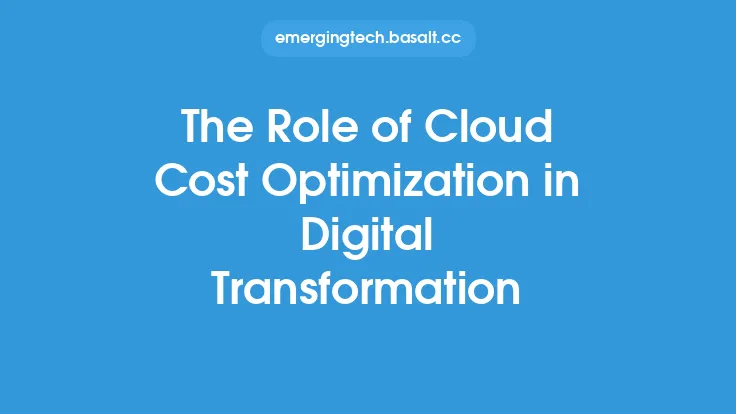As organizations continue to navigate the complexities of digital transformation, they are increasingly turning to hybrid cloud solutions to support their evolving needs. Hybrid cloud, which combines the benefits of public and private cloud environments, offers a flexible and scalable approach to IT infrastructure that can help businesses stay competitive in a rapidly changing market. In this article, we will explore the role of hybrid cloud in digital transformation, and provide guidance on how to leverage its power to drive business success.
Introduction to Hybrid Cloud and Digital Transformation
Digital transformation is the process of integrating digital technology into all areas of a business, with the goal of improving operations, enhancing customer experience, and driving innovation. It requires a flexible and agile IT infrastructure that can support the rapid deployment of new applications and services. Hybrid cloud, with its combination of public and private cloud environments, is well-suited to support digital transformation. By leveraging hybrid cloud, businesses can take advantage of the scalability and cost-effectiveness of public cloud, while also maintaining control and security in a private cloud environment.
Key Benefits of Hybrid Cloud for Digital Transformation
There are several key benefits of hybrid cloud that make it an attractive solution for businesses undergoing digital transformation. These include:
- Flexibility and Scalability: Hybrid cloud allows businesses to quickly scale up or down to meet changing demands, without being limited by the constraints of on-premises infrastructure.
- Cost-Effectiveness: By leveraging public cloud for non-sensitive workloads, businesses can reduce their capital expenditures and operating expenses.
- Enhanced Security and Compliance: Hybrid cloud allows businesses to maintain sensitive data and applications in a secure, private cloud environment, while still taking advantage of the scalability and cost-effectiveness of public cloud.
- Improved Collaboration and Innovation: Hybrid cloud provides a flexible and agile platform for developers to build and deploy new applications and services, which can help drive innovation and collaboration across the organization.
Technical Considerations for Hybrid Cloud Implementation
When implementing a hybrid cloud solution, there are several technical considerations that businesses should keep in mind. These include:
- Cloud Management Platforms: A cloud management platform can help businesses manage and orchestrate their hybrid cloud environment, providing a single pane of glass for monitoring and managing resources.
- Networking and Connectivity: Businesses should ensure that their hybrid cloud environment is properly connected, with secure and reliable networking and connectivity between public and private cloud environments.
- Security and Compliance: Businesses should implement robust security and compliance measures to protect sensitive data and applications in their hybrid cloud environment.
- Data Management and Integration: Businesses should consider how they will manage and integrate data across their hybrid cloud environment, including data migration, synchronization, and analytics.
Best Practices for Leveraging Hybrid Cloud in Digital Transformation
To get the most out of hybrid cloud in digital transformation, businesses should follow several best practices. These include:
- Develop a Clear Cloud Strategy: Businesses should develop a clear cloud strategy that aligns with their digital transformation goals and objectives.
- Assess Workloads and Applications: Businesses should assess their workloads and applications to determine which are best suited for public cloud, private cloud, or a combination of both.
- Implement a Cloud-First Approach: Businesses should adopt a cloud-first approach, where new applications and services are deployed in the cloud whenever possible.
- Monitor and Optimize: Businesses should continuously monitor and optimize their hybrid cloud environment, to ensure that it is running efficiently and effectively.
Real-World Examples of Hybrid Cloud in Digital Transformation
There are many real-world examples of businesses using hybrid cloud to support their digital transformation efforts. For example:
- Retail: A retail company might use public cloud to support its e-commerce platform, while maintaining sensitive customer data and applications in a private cloud environment.
- Financial Services: A financial services company might use hybrid cloud to support its online banking and trading platforms, while maintaining sensitive financial data and applications in a private cloud environment.
- Healthcare: A healthcare company might use hybrid cloud to support its electronic health records and medical imaging systems, while maintaining sensitive patient data and applications in a private cloud environment.
Conclusion
In conclusion, hybrid cloud is a powerful solution for businesses undergoing digital transformation. By leveraging the benefits of public and private cloud environments, businesses can create a flexible and scalable IT infrastructure that supports their evolving needs. By following best practices and considering technical considerations, businesses can get the most out of hybrid cloud and drive business success. As the digital landscape continues to evolve, it is likely that hybrid cloud will play an increasingly important role in supporting business innovation and growth.





